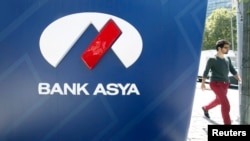Turkey’s banking watchdog has transferred control of Bank Asya to a state-run fund, purging its executives with a decision that effectively hands over the Islamic lender to the government.
Banking regulators seized control of Bank Asya citing a lack of transparency in its operations. The seizure is being seen as the latest chapter in a bitter feud between President Recep Tayyip Erdogan and U.S.-based Turkish cleric Fethullah Gulen and his Hizmet movement.
While Bank Asya denies any link to Gulen, political scientist Cengiz Aktar of Istanbul’s Suleyman Sah University says the bank was targeted by the government and president.
"Bank Asya's problems are artificial and they have been created by the government because Bank Asya belongs to the Hizmet movement and the government," Aktar said. "Actually the ruler of the country [President Erdogan] has decided to liquidate the movement and Bank Asya is an important source of finance so they are hitting Bank Asya."
Bank Asya woes started in December 2013 when the government and Erdogan were implicated in a high-level graft probe. Erdogan claimed the investigation was a coup attempt by Gulen followers. Since then Bank Asya has faced growing pressure from state authorities and the pro-government media.
Economy Minister Nihat Zeybeki defended the seizure of the bank.
"I believe it is necessary to stabilize financial markets and to end speculation, bringing about a safer environment," Zeybeki said.
The bank’s confiscation coincides with Turkish authorities canceling Gulen’s passport. He lives in self-imposed exile in the United States.
On Tuesday, Gulen penned an op-ed in The New York Times warning Turkey is sliding towards totalitarianism.
Global Source Partners political consultant Atilla Yesilada says there is growing concern the bank seizure is part of a new trend.
"I am already receiving questions from investors whom I serve about political connections of major listed companies. This has become an issue," Yesilada said. "This is one of the main reasons why business and consumer confidence has been declining steadily for the last five months."
An international network of schools set up by Gulen in more than 100 countries is also in Erdogan’s sights. The school network developed across Africa is not only an important source of education, but also for commerce, which is why analyst Yesilada says the Turkish president is determined to close them.
"Mr. Erdogan has already toured Africa and will probably arrange new visits to forcefully persuade African leaders to shut down Gulen schools. Gulen schools also serve as trading missions, trading outposts," he said. "So, I do not know the relationships between these schools and the local leaders and communities, but if they were going to shut down, I can assure you that trade relationship between those countries and Turkey would deteriorate substantially."
Bank Asya last month said it was selling its 40 percent stake in Senegal-based Tamweel Africa Holding for $37.7 million.
As Bank Asya continues to sell off its interests in Africa, Erdogan continues to ratchet up his focus on the region.
In 2004, Turkey had only 12 embassies in Africa. Today, it has 39 and the next Turkish embassy will be opened in Equatorial Guinea this year. A decade ago, Turkey's total trade with Africa was less than $3 billion. Today, the trade volume has exceeded $25 billion and Turkish Airlines flies to about 40 points in more than 30 African countries - more than any other international airline.










